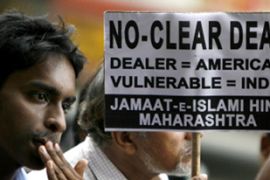Bush signs India nuclear deal
Controversial deal allows India access to US technology and cheap energy.

Those opposed to the deal say it undermines efforts to curb nuclear proliferation and could trigger an arms race in South Asia, particularly with India’s nuclear armed neighbour – Pakistan.
Controversial deal
The agreement offers India access to US technology and cheap atomic energy in return for permitting United Nations inspections of some of its civilian nuclear facilities – but not military nuclear sites.
It was passed by the US senate last Wednesday, while in July the Indian government narrowly survived a confidence vote over the deal following protests.
Washington imposed a ban on US-Indian civilian nuclear trade following India’s first nuclear test in 1974.
However, US officials have pointed to rising oil prices and global warming concerns as proof India needs assistance to meet its energy needs.
“Even though the United States and India are separated by half the globe, we are natural partners as we head into the 21st century,” Bush said.
By signing the authorisation, Bush is required to certify that the agreement with India – which has not signed the Nuclear Non-Proliferation Treaty (NPT) – is consistent with US obligations under the treaty, which was designed to limit the spread of nuclear weapons.
He must also certify that it is US policy to co-operate with global efforts to restrict transfers of technology related to uranium enrichment and the reprocessing of spent nuclear fuel.